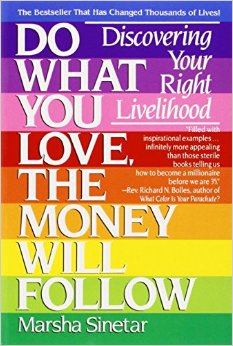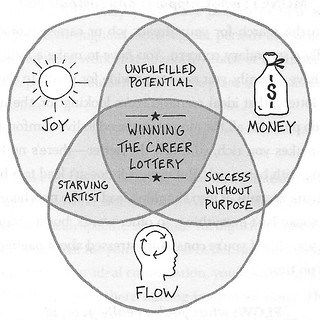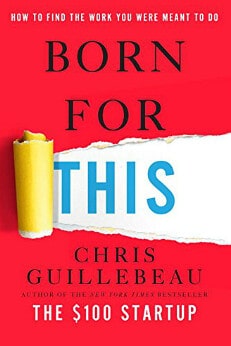How to find a job you love: Land a dream job that brings both joy and money


Sinetar is a proponent of what she calls Right Livelihood: Doing your best at what you do best.
“Each of us, no matter how ordinary we consider our talents, wants and needs to use them. Right Livelihood is the natural expression of this need,” she wrote. “When we consciously choose to do work we enjoy, not only can we get things done, we can get them done well and be intrinsically rewarded for the effort. Money and security cease to be our only payments.”
“Do what you love” sounds like a great idea — who wouldn’t want a dream job that was both fun and paid the bills? — but as many people have pointed out over the past thirty years, it’s generally poor career advice. When folks cling to the belief that they’ll have no trouble if they do what they love, they run the risk of not being able to make ends meet.
One obvious problem is that not everything you enjoy doing can generate a reliable source of income. I like videogames, for instance, but I’ll never make big bucks playing Hearthstone. It’d be foolish to try.
A few years ago, career columnist Penelope Trunk put it this way: “I am a writer, but I love sex more than I love writing…I don’t sit up at night thinking, should I do writing or sex? Because career decisions are not decisions about ‘what do I love most?'”
There’s another problem that’s seldom mentioned. When people do manage to find what they think is their dream job, to make a career out of what they love, they frequently lose enthusiasm for the very thing they once valued. I’ve experienced this first-hand.
When I started Get Rich Slowly in 2006, I was working as a salesman for the family box factory. I didn’t like my day job, so blogging was a fun escape. Eventually, I made enough from blogging that I could quit my job selling boxes to write full time. I was going to do what I loved! Awesome, right? In many ways, it was awesome — but it also quickly became a curse. Writing went from a fun escape to a tedious chore, a slog instead of a joy. (That’s one reason I sold this site in 2009.) When I repurchased the site last fall, I thought long and hard about how to avoid falling into that trap once again. (So far, so good!)
Having said all that, I don’t think it’s bad to seek your dream job. In fact, I believe it’s a worthwhile goal — as long as you have realistic expectations (and can be patient). The challenge is to juggle what you’re good at, what you enjoy, and what people will pay you to do.
The Intersection of Joy, Money, and Flow
In 2016, my friend and colleague Chris Guillebeau published a book called Born for This: How to Find the Work You Were Meant to Do.
“There’s more than one possible path to career success,” Guillebeau writes, “but you want to find the best one — the thing you were born to do.” He says that this “best path” is located at the intersection of joy, money, and flow.
Ideally:
- Your work should make you happy. Similar to Sinetar, Guillebeau believes you should enjoy what you do for work. In a way, it’s like the Konmari Method of organization, which argues you should own only things that “spark joy”. Guillebeau seems to be saying that ideally your work will “spark joy” too.
- Your work should make you money. It’s no good pursuing your passion if nobody will pay you to do so. You need to be compensated for your efforts. Fundamentally, your work must support and sustain you.
- Your work should tap your talents. Your career should involve something you’re really good at; it should allow you to put your skills to good use.
A perfect job — and there may be more than one “perfect job” for you — can be found where joy, money, and flow come together. An illustration from the book might help you visualize this concept:

The key, of course, is actually finding work at the intersection of joy, money, and flow. It’s one thing to talk about wanting this sort of perfect career, but it’s another thing entirely to discover a job that sits in the sweet spot. That’s what Born for This is all about.
Clarification: I don’t like Guillebeau’s use of the term “flow” in this context. It doesn’t match the psychological definition, so it creates confusion rather than clarity. Instead of “flow”, I think it makes more sense to talk in terms of talent or skill: Your ideal job(s) can be found at the intersection of joy, money, and skill.
How to Find Your Dream Job

Expand your options — then limit them
To help find work you were meant to do, Guillebeau advocates drawing up a large list of career possibilities, then pruning that list to a handful of dream jobs. Based on concepts in Born for This, I’ve created a simple exercise that I think can help provide direction for those who feel lost in their careers.
- First, get clear on your purpose. Before you complete the rest of this exercise, be sure you’ve created a personal mission statement to guide your decisions. (Need help? Here’s a free PDF describing my method for finding a mission statement.)
- Next, spend fifteen minutes brainstorming a list of possible careers. At this point, it’s important that you don’t self-censor. Go crazy! List anything and everything that you could do for work. If you’ve always wanted to be an astronaut, put “astronaut” on the list. I’m serious. Write down whatever comes to mind, no matter how impractical.
- Now, limit your options. This is the time to be rational and practical. Go through your list and remove anything that doesn’t spark joy. Remove anything that doesn’t seem like a source of income. Finally, remove those options for which you don’t have the talent (or for which developing the skill would be impractical).
- Lastly, choose your five favorite options from those that remain. (If you have fewer than five, that’s fine.) Rank these dream jobs from top to bottom based on any criteria you choose. These are the career options you should pursue long-term.
Once you’ve made your list of dream jobs, learn more about these fields of work. Develop the skills you need to pursue these professions. Schedule informational interviews with people who do the kind of work you’re interested in doing. Over the months and years ahead, use this list to plot your career path.
Master the Right Skills
If you want to improve your marketability overall — not just within your field — Guillebeau says it’s vital to “improve the right skills”. If you boost technical skills specific to your field, that’ll help you climb the career ladder for your current profession. But if you strengthen universal “soft skills”, you’ll not only become a better employee but a better person overall.
Useful universal skills include things like:
- Writing ability. If you can express yourself with pen and paper (or with keyboard and pixels), you’ll always have opportunities. Companies of all sizes need employees who can help them communicate.
- Public speaking. If you’re able and willing to talk to people — especially groups of people — the world is your oyster. I know a handful of folks who are masters of public speaking, and they’re essentially able to pick who they work for and name their salary. Not kidding.
- Negotiation. When you learn to negotiate, you can use this skill not only to help yourself but also to help your employer. On a personal level, you can use negotiation skills to increase your salary and obtain additional benefits. On a business level, you can put this into practice by getting better prices from suppliers — or convincing customers to pay more.
- Follow-up and follow-through. Do what you say you’ll do, and do it well. No matter what job you choose, the ability to keep your commitments (and even to exceed expectations) will make you a valuable employee.
- Tech savvy. Get up to date (and stay up to date) with modern technology, whether that means learning to use a smartphone or teaching yourself how to work with social media. People who know how to use the latest tech are always in demand.
These soft skills will help with anything you choose to do, whether in your current field or an entirely different career. Plus, most of them will come in handy for life outside the workplace.
Become Indispensable
There’s no doubt that Guillebeau favors self-employment. Much of his own career has been built on helping others start small businesses. All the same, he understands that not everyone wants to work for themselves.
However, if you’re an employee you can still act as if you’re a small-business owner. “You are self-employed one way or another,” writes Guillebeau. “Even if you’re earning a steady paycheck, you are essentially self-employed in terms of being responsible for your career.“
Amen!
Whether you work for yourself or work for somebody else, you are 100% responsible for your income. Most people approach their careers passively. If they have a job, that’s good enough. They do little (if anything) to improve their skills. They do the bare minimum that’s asked of them. They don’t bother to bargain when they’re hired or given a performance review.
Because you’re reading Get Rich Slowly, you are not not “most people”. To use the terminology of my previous site, you are a money boss. You take responsibility for your personal life, for your financial life, and for your career. You understand the importance of managing your career as if you were managing a business. Part of that means becoming indispensable to your biggest client…your employer.
Note: For more on this subject, see yesterday’s article about how to grow your career.
There are two key facets to becoming indispensable:
- Improve education. Education has a greater impact on your work-life earnings than any other factor. You should always be learning, whether it’s for yourself or your employer. Go to conferences. Take classes at the community college. Read books related to your field. Take time to learn what other people in your office do. Master the “soft skills” we talked about earlier, but pick up technical knowledge too. Remember: The more you learn, the more you earn.
- Exceed expectations. The vast majority of workers do only what’s needed to get by. (Some don’t manage that!) They don’t take the initiative to learn and do more. An indispensable employee does more than she’s asked. She doesn’t wait to be told what to do; she knows what needs to happen next and she does it. She sees problems and solves them.
Take your career seriously. Your job isn’t a place to kill time or tread water. It’s important. Even seemingly trivial jobs are a chance for you to get ahead, and can eventually lead to work you were meant to do.
During my sophomore year of college, I had a work-study job with the campus Summer Activities department. Every afternoon from four to five, it was my job to answer the phone after my boss had gone home. And that’s all I ever did. I never showed much enthusiasm for the job. I only answered the phone. (And worked on my homework.)
Another student had the same job covering the phone before my boss got to work in the morning. Unlike me, however, he did more than he was asked. Much more.
Neither of us knew it at the time, but our boss held a lot of clout on campus. When the other student applied for a plum job with the admissions office, she pulled strings to help him get the position. When I applied for a job I really wanted with the residence life department, I didn’t get it. I found out later that my lack of initiative in what seemed like a meaningless work-study job had played a huge role in their decision not to hire me.
The other student had made himself indispensable, and it paid. My lackadaisical attitude held me back.
The bottom line? Whether you’re looking for your dream job or not, be your own boss — even if somebody else can lay claim to that actual title. Be so good they can’t ignore you. Do this and doors will open up for you.
Become A Money Boss And Join 15,000 Others
Subscribe to the GRS Insider (FREE) and we’ll give you a copy of the Money Boss Manifesto (also FREE)

